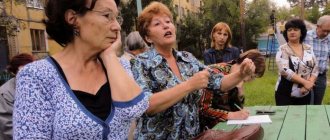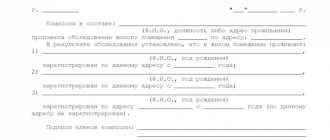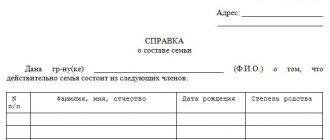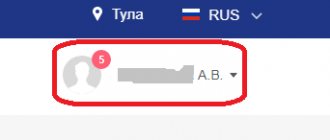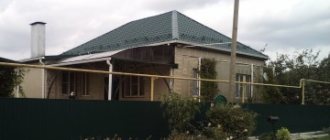Home / Conflict with neighbors / Act on residence or non-residence at the address
For various reasons, the place of registration of citizens does not always coincide with the place of their actual residence. If it is necessary to confirm where exactly a person lives or does not live, a special act is drawn up. In what situations might it be needed? What is needed to draw up a document?
What is it and what is it for?
The name of the Act of Residence or Non-Residence speaks for itself. Using a document, you can confirm that a person actually lives (does not live) at a certain address for some time.
There is no mention of the document in the laws of the Russian Federation. It appears only in Decree of the Government of the Russian Federation No. 354 “On the provision of utility services to owners...”, where Part IV indicates the possibility of using it to calculate payment amounts for utility services. But in practice, the need for registration may arise under various circumstances:
- The need for forced discharge. If one of the residents refuses to voluntarily check out after moving (in order to retain the right to use the apartment) and does not participate in paying for utilities and repairs, the owner can obtain a checkout in court. The act of non-residence will be an additional justification for filing a claim. Read more: Forced eviction from an apartment through the court
- Registration of a subsidy. The document will confirm the number of people who are actually consumers of utility services (and not just registered at a specific address) and bring income to the family, on the basis of which the required subsidy amount is calculated. A similar revision is carried out if the consumption of utility services is recorded using individual metering devices.
- Early termination of the lease agreement. If the tenant does not live at the specified address for a long time and does not pay rent, the owner of the premises has the right to demand through the court that the lease agreement be terminated unilaterally.
- Claims from creditors or the enforcement service against the previous property owner/tenant. If the debtor indicated at the conclusion of the loan agreement a specific address at which creditors are looking for him to collect debts, the Act will confirm the residence at the address of people who are not related to the debtor.
- The need to recalculate utilities. Consumers are required to inform utility providers about the number of people living in the apartment. If one of the residents listed among the officially registered ones actually has a different place of residence and does not pay for utilities or simply leaves for a long time, the execution of the Act will make it possible to achieve a recalculation of the amounts due. Otherwise, service consumption will be calculated based on the number of registered persons.
- Eviction of neighbor tenants who violate the rules of residence. If the owners do not want to take any action, neighbors can independently draw up a document confirming that the legal owners do not live in their apartment. It will be additional evidence when filing a complaint to higher authorities.
- Other circumstances. When applying for benefits, allowances, medical policies, credit and some legal agreements, obtaining education or performing certain actions at the tax service, it is often necessary to provide documentary evidence of the applicant’s actual residence.
How to get to the apartment
A variety of situations can happen when utility workers, rescuers or government officials need to get into the apartment. The reason may be leaking pipes, gas leaks, cracks in the walls of the house associated with illegal redevelopment.
Previously, according to the law, no stranger could enter the apartment without the owner’s permission. And often, denial of access to living quarters created many serious problems for others.
Now authorized persons can draw up an act of non-admission to the apartment, on the basis of which the court grants permission for forced entry. If the owner of the apartment, who has been living at a different address for a long time, does not provide access to the housing, two acts may be drawn up - on non-admission and non-residence. The culprit will also receive a fine for not living at the registered address.
Who can draw up a document
The initiator of drawing up the Act is often the owner of the property. Directly issuing a form confirming the fact of residence or non-residence at the address can be done by:
- authorized person of the management company, housing department, housing utilities;
- district police officer;
- employee of registration departments of law enforcement agencies;
- bailiff;
- neighbours;
- the homeowner himself, with the support of witnesses;
- other interested citizens.
In practice, interested parties are often united in a commission, which may include neighbors, a local police officer, or an employee of the management company. The main thing is that the number of commission members is more than 3.
Expert opinion
Dmitry Nosikov
Lawyer. Specialization: family and housing law.
If a person does not deny the fact of non-residence, he can independently write a statement that he did not live at a certain address, without involving third parties. This will serve as the basis, for example, for recalculating the amount of utility bills. If he becomes aware that the Act of Non-Residence was drawn up with dishonest intentions (for illegal eviction from living space, etc.), he has the right, for his part, to draw up his own copy, which, on the contrary, will confirm his residence at the same address.
Advantages
Most often, the document is requested when initiating the process of forced eviction of a person from a living space. An eviction application can be filed by the owner of the property if someone is living in his apartment illegally, having a residence permit in a completely different place.
You can also contact us to draw up this document if you need to recalculate the utilities calculated for the absent tenant of the apartment. You can write a document in any form, inviting an authorized person and neighbors as witnesses.
The procedure for drawing up the act
When registering, you must adhere to the following sequence of actions:
- Decide on the composition of the commission. For this purpose, it is necessary to interview neighbors about their consent to participate in such a procedure, and, if necessary, to additionally confirm their testimony.
- Conduct an inspection of the residential premises at the agreed time to establish the fact of residence or non-residence.
- Record the results of the inspection in writing.
- Sign to all members of the commission. The document acquires legal force immediately after signing by all persons present.
If the commission includes neighbors, you need to make sure that they use the housing legally and live at their current address for at least the period of time specified in the Act.
The inspection of the residential premises and the subsequent drawing up of the document must take place in the presence of the owner of the property or his legal representative, acting in accordance with a notarized power of attorney. During the inspection, the presence of the citizen’s personal belongings is determined, in relation to which the fact of residence needs to be confirmed or denied, and other signs that may indicate the number of residents (for example, the number of beds, the number of cutlery). The following may be used as additional evidence:
- certificates with a period of more than 5 days about work trips, hospital treatment;
- invoices from hotels indicating check-in and check-out dates;
- official certificate of another place of registration issued by law enforcement agencies;
- facts of contacting medical institutions, management companies, housing departments serving the specified address;
- payment documents confirming the division of costs for maintaining the property.
What information does it contain?
The current legislation does not provide for a single model of the Act. It can be compiled in free form with the obligatory indication of the following information:
- Name;
- date and place of registration;
- composition of the commission members (full name, residential address);
- full address of the apartment;
- information about the initiator of the procedure;
- information about the residence or non-residence of the citizen in relation to whom the procedure was initiated, including the date from which the specified event lasts and evidence confirming it (for example, the presence/absence of personal belongings in the apartment);
- statement about the actual location of the tenant or the absence of this information (for the Non-Residence Act);
- signatures of those present.
If the owner refuses to sign, a corresponding note is made in a separate column. Additional evidence of the information specified in the document can be obtained from interviews with witnesses. If available, it is recommended that all available materials be attached to the Act.
The document is submitted at the place of request: when calculating utility bills - to the Management Company, when forced deportation - to the court, when evicting foreign tenants - to the migration service, etc.
Features of individual options
The general procedure for execution and content of the document are the same for all cases. But depending on where it is supplied, a number of points should be taken into account:
- For the court. At the relevant trial, all named members of the commission will be required to be present to testify, so when selecting applicants, this possibility should be assessed in advance for each of them. The refusal of one of the drafters will cast doubt on the authenticity of the Act.
- To apply for a subsidy. In order for the document to be reviewed by the authorized bodies without any problems, it is recommended to involve a district police officer in its preparation.
Kinds
Although there is no strict standard for drafting such a document, the location where the document is sent should still be taken into account.
If an act is needed for the court, all parties to the conflict must be present at the trial . The homeowner's attorney may be present instead. Written evidence from neighbors and other residents of the apartment is attached to the act.
When drawing up a document about non-residence to receive subsidies, it is worth using confirmation of this fact from the district police officer as evidence. In this case, the document will be reviewed by the authorized bodies without any problems. The form of the act remains free and arbitrary.
Sample acts
The process of drawing up an Act of residence or non-residence requires taking into account a number of nuances.
What do you need to consider when preparing a document in your situation? Contact our website lawyers for a free consultation. Experienced specialists will tell you how to correctly draw up a document in a given case. Attention!
- Due to frequent changes in legislation, information sometimes becomes outdated faster than we can update it on the website.
- All cases are very individual and depend on many factors. Basic information does not guarantee a solution to your specific problems.
That's why FREE expert consultants work for you around the clock!
- via the form (below), or via online chat
- Call the hotline:
- Moscow and the Region
- St. Petersburg and region
- FREE for a lawyer!
By submitting data you agree to the Consent to PD Processing, PD Processing Policy and User Agreement.
Anonymously
Information about you will not be disclosed
Fast
Fill out the form and a lawyer will contact you within 5 minutes
Tell your friends
Rate ( 2 ratings, average: 4.50 out of 5)
Text
The document is drawn up in written form, without any specific requirements. But the following sections must be present:
- Title of the document.
- The composition of the special commission that draws up the act. Each last name and first name is supplemented with the address of a commission member.
- Then there is a section describing the inspection of the premises, which is carried out taking into account current laws.
- The result of the inspection should be confirmation that the person lives at this address (or does not live). This can be confirmed by personal belongings, other signs, testimony of neighbors, other residents of the apartment.
- The act is signed, the date of preparation is indicated, and the exact address is indicated.
Despite the fact that the act is drawn up in any form, the information in it must be truthful, reliable, and accurate.
Reduced utility bills
In the absence of meters, utility bills are charged either depending on the square footage of the residential premises, or depending on the number of registered ones.
In the case where communal services are charged to persons who are registered but do not actually live in a specific living space, the main tenant or owner can, without deregistering, ask the utility services to reduce the accrued payments.
The fact of non-residence will be confirmed by a corresponding act.
About fictitious registration
Before drawing up an act, you should definitely clearly define why it is necessary and what the consequences will be. If it turns out that the document for non-residents is issued due to fictitious registration, the owner of the property will have to bear the greatest responsibility. Such situations most often arise at the initiative of neighbors who are in conflict with the defendant.
Responsibility measures:
- A fine is the mildest measure to prevent fictitious registration;
- Forced labor - assigned by the court if the latter considers that the defendant’s guilt is more serious;
- Imprisonment is only by court decision, the most severe measure.
The introduction of criminal liability occurred relatively recently. This rule began to be applied to reduce the number of invalid registrations, which people use quite often. That is why, before writing any complaint, it makes sense to consult with an experienced legal professional.
